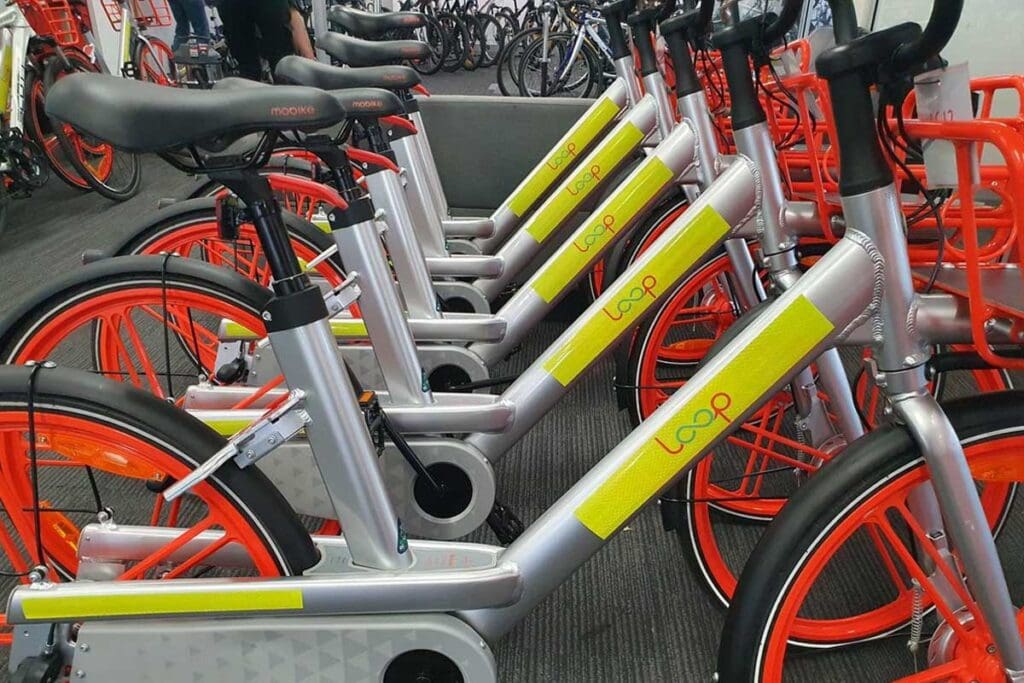$65 Price Tag as Revolve Starts Selling Repurposed Mobikes

Sydney, NSW
Bicycle recycling enterprise Revolve ReCYCLING has begun selling the redeployed bikes it accessed from the failed Mobike and OnYaBike share bike services.
The Sydney-based organisation in March gained approval to repurpose the estimated 1,000 to 1,300 bikes left in a warehouse, never used, when OnYahbike by Mobike went bankrupt late last year.
Revolve ReCYCLING general manager Guido Verbist said within three weeks of putting the rebadged Loops bikes on the market, his group sold 20 of the three-speed bikes, which are estimated to comprise around 150 of the total abandoned fleet.
The profit-for-purpose organisation has earmarked the three-speed models for the Sydney market, because they were better suited to the city’s hills, while opportunities are being explored for the remaining single-speed bikes.
The company is selling the three-speed models for $65 each, which was less than they had originally envisaged for the aluminium-framed bikes – complete with plastic wheels, solid rubber tyres, solar-powered lights and a basket.
“They’re heavy, around 22kg, so it’s not a bike you would use for a leisure trip. They’re a basic city commuting bike to go from A to B, for work or shopping,” Guido said.
“We came to the price after testing the market. We’d started higher about six months ago, when we first had access to a handful of the bikes, and found $65 is what people are prepared to pay.
“There’s certainly interest but it will probably take a few months to get through the first batch and we’ll be looking at when we take more from the warehouse. We’re under no commitment to take them within a certain timeframe, or even to take any more at all.
“After it took quite a while to get access to the bikes, the owner had no interest in getting money for them.”
Revolve ReCYCLING is planning to display the Loop bikes at local universities, as the company sought to target students as a prime market for the bikes.
Interest in the Netherlands
Guido said he has been contacted by a Netherlands share service provider interested in purchasing all of the single-speed models, which would be perfect for the country’s flat topography.
“That would be a great outcome and we are just looking at the details of the proposal,” he said.
His company is also talking to not-for-profit organisation Good360, which recycles as many end-of-stock goods as possible. It aims to find ways to reuse those materials, through its network of not-for-profit and social enterprises.
“Good360 heard about those bikes becoming available and is checking its network to see who would be willing to receive them,” Guido said.
“There would be some cost in transporting them but otherwise, if Good360 can make use of them, the bikes would just be a donation.”
Guido had been in negotiation with the liquidator, in consultation with City of Sydney council, since OnYahbike went bankrupt.
It has also teamed with several share service providers in Sydney to locate OnYahbike bicycles that had been abandoned on Sydney streets since the bankruptcy, and transport them to Revolve ReCYCLE’s headquarters in Alexandria.
Guido said the program has so far retrieved about 200 of an estimated 300 bikes that are believed to have been on the streets but are not easily located after the operator shut down its app.
The Chinese-owned share service was launched in Australia as Mobike in 2017 and was purchased a year later by Chinese e-commerce giant Meituan Dianping for $US2.7 billion (A$3.88 billion).
Meituan offloaded the business the following year to a group of investors reportedly led by a Chilean investor.
Exploring Opportunities and Trials of E-Bike Recycling
Revolve ReCYCLING is also beginning to look at how it could start to receive and redeploy e-bikes.
The organisation has recycled nearly 4,700 bicycles since it was established in 2021 but had delayed dealing with e-bikes because of their batteries.
“There are a lot of hurdles we would have to overcome before we can work with them and redeploy them with confidence,” Guido said.
“The issue is the batteries and warranties – including being able to test those batteries. All of this would come with investment and access to software we don’t have.
“We knew from day one it was probably a market we would need to move into. We need to investigate how we can make it happen.
“We will have to invest in special equipment and set up a safe environment to do battery testing because lithium batteries are also explosive, so there are many complications we would need to get our heads around.”
He said the recycling process would benefit greatly from more stringent quality controls on e-bikes – and their batteries – when they are sold new in Australia.
“It’s comparable to the first generations of mobile phones, when there were so many different models and standards and qualities. Even with the chargers, there were so many options available,” he said.
“We’re now seeing that with e-bikes.
“It’s such a grey zone, even for e-bike shops, who don’t want to touch those second-hand bikes.”
